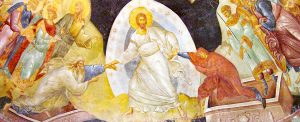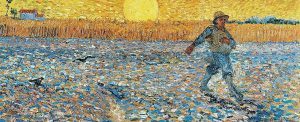The Letter of Ignatius, Bishop of Antioch, to Polycarp, Bishop of Smyrna
Translated by Cyril Richardson
Along with the letter to the church of Smyrna, Ignatius wrote to its bishop, Polycarp. One of the most distinguished figures of the Early Church, who crowned his old age with martyrdom, Polycarp had given Ignatius a generous welcome which the latter mentions in other letters (Eph., ch. 21; Mag., ch. 15). This is an intimate and personal letter—the shortest of them all. Polycarp was the younger of the two men, perhaps in his early forties, and Ignatius is characteristically forthright in his advice. That the latter was most highly regarded by the bishop of Smyrna is clear from his own letter to the Philippians and from his making a collection of Ignatius’ correspondence (Polycarp, Phil., ch. 13).
The sense of Christian solidarity which bound together the local churches is evident from the various delegations which Ignatius received in Smyrna. The suggestion, however, in the letter to the Philadelphians and repeated in this one to Polycarp, that the churches should send delegates as far as Syrian Antioch to congratulate the Christians on the cessation of persecution, is a telling witness to the universal consciousness of the local congregations. In a day when travel was neither easy nor free from danger, the dispatching of such messengers reflects the deep unity of the Christian brotherhood.
The text
Heartiest greetings from Ignatius, the God-bearer, to Polycarp, who is bishop of the church at Smyrna — or rather who has God the Father and the Lord Jesus Christ for his bishop.
While I was impressed with your godly mind, which is fixed, as it were, on an immovable rock, I am more than grateful that I was granted the sight of your holy face. God grant I may never forget it! By the grace which you have put on, I urge you to press forward in your race and to urge everybody to be saved. Vindicate your position by giving your whole attention to its material and spiritual sides. Make unity your concern — there is nothing better than that. Lend everybody a hand, as the Lord does you. “Out of love be patient” with everyone, as indeed you are. Devote yourself to continual prayer. Ask for increasing insight. Be ever on the watch by keeping your spirit alert. Take a personal interest in those you talk to, just as God does. “Bear the diseases” of everyone, like an athlete in perfect form. The greater the toil, the greater the gain.
It is no credit to you if you are fond of good pupils. Rather by your gentleness subdue those who are annoying. Not every wound is healed by the same plaster. Relieve spasms of pain with poultices. In all circumstances be “wise as a serpent,” and perpetually “harmless as a dove.” The reason you have a body as well as a soul is that you may win the favor of the visible world. But ask that you may have revelations of what is unseen. In that way you will lack nothing and have an abundance of every gift.
Just as pilots demand winds and a storm-tossed sailor a harbor, so times like these demand a person like you. With your help we will get to God. As God’s athlete, be sober. The prize, as you very well know, is immortality and eternal life. Bound as I am with chains that you kissed, I give my whole self for you — cheap sacrifice though it is!
You must not be panic-stricken by those who have an air of credibility but who teach heresy. Stand your ground like an anvil under the hammer. A great athlete must suffer blows to conquer. And especially for God’s sake must we put up with everything, so that he will put up with us. Show more enthusiasm than you do. Mark the times. Be on the alert for him who is above time, the Timeless, the Unseen, the One who became visible for our sakes, who was beyond touch and passion, yet who for our sakes became subject to suffering, and endured everything for us.
Widows must not be neglected. After the Lord you must be their protector. Do not let anything be done without your consent; and do not do anything without God’s, as indeed you do not. Stand firm. Hold services more often. Seek out everybody by name. Do not treat slaves and slave girls contemptuously. Neither must they grow insolent. But for God’s glory they must give more devoted service, so that they may obtain from God a better freedom. Moreover, they must not be overanxious to gain their freedom at the community’s expense, lest they prove to be slaves of selfish passion. Flee from such wicked practices — nay, rather, preach against them.
Tell my sisters to love the Lord and to be altogether contented with their husbands. Similarly urge my brothers in the name of Jesus Christ “to love their wives as the Lord loves the Church.” If anyone can live in chastity for the honor of the Lord’s flesh, let him do so without ever boasting. If he boasts of it, he is lost; and if he is more highly honored than the bishop, his chastity is as good as forfeited. It is right for men and women who marry to be united with the bishop’s approval. In that way their marriage will follow God’s will and not the promptings of lust. Let everything be done so as to advance God’s honor.
Pay attention to the bishop so that God will pay attention to you. I give my life as a sacrifice (poor as it is) for those who are obedient to the bishop, the presbyters, and the deacons. Along with them may I get my share of God’s reward! Share your hard training together — wrestle together, run together, suffer together, go to bed together, get up together, as God’s stewards, assessors, and assistants. Give satisfaction to Him in whose ranks you serve and from whom you get your pay. Let none of you prove a deserter. Let your baptism be your arms; your faith, your helmet; your love, your spear; your endurance, your armor. Let your deeds be your deposits, so that you will eventually get back considerable savings. Be patient, then, and gentle with each other, as God is with you. May I always be happy about you!
News has reached me that, thanks to your prayers, the church at Antioch in Syria is now at peace. At this I have taken new courage and, relying on God, I have set my mind at rest — assuming, that is, I may get to God through suffering, and at the resurrection prove to be your disciple. So, my dear Polycarp (and how richly God has blessed you!), you ought to call a most religious council and appoint somebody whom you regard as especially dear and diligent, and who can act as God’s messenger. You should give him the privilege of going to Syria and of advancing God’s glory by extolling your untiring generosity. A Christian does not control his own life, but gives his whole time to God. This is God’s work, and when you have completed it, it will be yours as well. For God’s grace gives me confidence that you are ready to act generously when it comes to his business. It is because I am well aware of your earnest sincerity that I limit my appeal to so few words.
I have been unable to write to all the churches because I am sailing at once (so God has willed it) from Troas to Neapolis. I want you, therefore, as one who has the mind of God, to write to the churches ahead and to bid them to do the same. Those who can should send representatives, while the others should send letters by your own delegates. In that way you will win renown, such as you deserve, by an act that will be remembered forever.
Greetings to every one of you personally, and to the widow of Epitropus with her children and her whole family. Greetings to my dear Attalus. Greetings to the one who is to be chosen to go to Syria. Grace will ever be with him and with Polycarp who sends him. I bid you farewell as always in our God, Jesus Christ. May you abide in him and so share in the divine unity and be under God’s care. Greetings to Alce, who means a great deal to me. Farewell in the Lord.
From Early Christian Fathers, translated by Cyril Richardson






